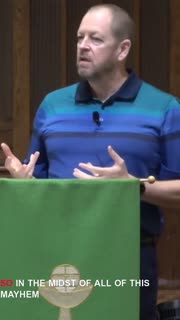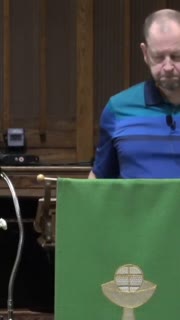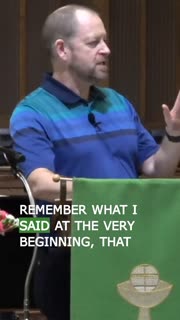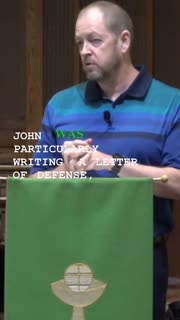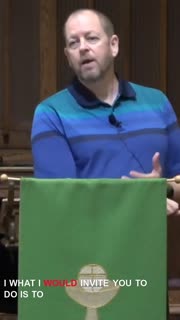Revelation: Hope and Resilience Amidst Persecution
Devotional
Sermon Summary
Bible Study Guide
Sermon Clips
### Quotes for outreach
1. "And so John is writing this, he's setting the stage for this final vindication. This, this, there's, we get into this sort of Armageddon kind of concept of this final, and in, in eight, chapter 18, which we didn't read, John writes how this, this Babylonian empire has fallen, fallen, fallen, Babylon the great. So he's referring to Rome. So in chapter 18, we see this intervention. Now God is starting to bring to a sense of completion, this grand vision, and we get to 19, which we read, which if you just read it through quickly, this ger han, this Pokemon that's, which is Caesar, does this mean that God will come of a prelude, which really is this sédad by playing wrench, really just an exhortation of praise." [08:53] (51 seconds)
2. "So in the midst of all of this mayhem all of this terror all of this destruction God's vision through John is ultimately one where it is resolved God wins and everything that we associate with with all of the human capacity to exploit the power of empires to destroy all of that is you has no authority over God." [10:30] (29 seconds)
3. "But what's interesting about chapter this particular part of but particularly Revelation itself most Christians you know we love to to say hallelujah don't we we love to say hallelujah in fact for the longest time during Lent as Christians we were we were told don't say hallelujah save it for Easter morning and then we would sing the how you know we had a choir we would sing the hallelujah chorus right well hallelujah really what of course that is praising Yahweh that's what hallelujah means yeah way is one of the Hebrew words for God but interestingly enough this is the only place in the New Testament that you hear the word hallelujah did you know that it's this common misconception that hallelujah is rife through the entire New Testament through the God no it's not book of Revelation is the first time we really get to hear this word this a day at the temple in the明流 praising yahweh it is in the psalms hallelujah mightily lifted up with authority and power and majesty and grace in the psalms but it's not until we get to this book in the new testament in the christian bible where this notion of praising god really is fully fully exposed spoken of and when you stop and think about it that this word hallelujah which perhaps we have stolen as christians we've we've we've stolen from the hebrew language we've stolen from judaism." [12:18] (113 seconds)
4. "So what does that mean it it means what i've been trying to tell you for quite a while that this this book is not only about fulfilling god's final prophetic so that end of times uh vision that final and and full and complete revelation of god but it it only can happen when this this christian community that was starting to form can really truly be reunited with its roots in judaism that that's what's being praised here this one god one covenant one powerful vision and it's it's really a clarion call to see jesus in a new light to see jesus in a fulsome light and in in understanding and and and really accepting that." [12:18] (59 seconds)
### Quotes for members
1. "Remember what I said at the very beginning, that this is a kind of biblical code written, by this figure John of Patmos. He's on the island of Patmos. He's escaped all the destruction and devastation that happened in the end of the first century, the destruction of Jerusalem, a series of very chaotic, you know, really difficult experiences. And he finds himself with this incredible vision that he's been given. And we've worked our way through this vision. Each of these vivid images kind of represents something, and represents something that would have been understood for the community that he was writing to." [01:49] (51 seconds)
2. "John was particularly writing a letter of defense, kind of even a manifesto of defense against persecution that they were facing. And he was writing a letter of defense against they were experiencing, and all of the very cataclysmic things that had happened at the end of the first century. And he's particularly writing to the sort of earliest community of Jesus' followers, which we would call today Messianic Jews. And the Messianic Jewish community was in conflict with the remnant of the Jewish community that was left following the destruction of Rome, and the destruction of the temple, and everything that was at the heart of Judaism up to that point had been broken." [03:37] (52 seconds)
3. "So it's really symbolic of all of the empires that have defied God. This whore is the city of Rome and all that it represents, the power, the authority, the persecution, the violence, and in turn, all those earthly cities for these other empires that were in and around the region at the time. And we know these other empires are serving the whore. That's the fornication reference. Why? Well, we're talking about a kind of global power for its context, global power, global commerce and trade, global exploitation." [06:54] (43 seconds)
4. "I what i would invite you to do is to not and i've been saying this from the beginning not reject this vision completely but see in it your little place your small contribution to this ultimate vision that god has defined and enshrined for us and if you can bring that into your life if you can just be the person who who recognizes the supremacy of god who understands that you have a in the big scheme of thing a small role to play but it's an important role for you and it should never be minimized because you're part of something so much more grand and so much more beyond your capacity to fully understand but just know and that you're part of it." [16:06] (66 seconds)
Ask a question about this sermon
1. "And so John is writing this, he's setting the stage for this final vindication. This, this, there's, we get into this sort of Armageddon kind of concept of this final, and in, in eight, chapter 18, which we didn't read, John writes how this, this Babylonian empire has fallen, fallen, fallen, Babylon the great. So he's referring to Rome. So in chapter 18, we see this intervention. Now God is starting to bring to a sense of completion, this grand vision, and we get to 19, which we read, which if you just read it through quickly, this ger han, this Pokemon that's, which is Caesar, does this mean that God will come of a prelude, which really is this sédad by playing wrench, really just an exhortation of praise." [08:53] (51 seconds)
2. "So in the midst of all of this mayhem all of this terror all of this destruction God's vision through John is ultimately one where it is resolved God wins and everything that we associate with with all of the human capacity to exploit the power of empires to destroy all of that is you has no authority over God." [10:30] (29 seconds)
3. "But what's interesting about chapter this particular part of but particularly Revelation itself most Christians you know we love to to say hallelujah don't we we love to say hallelujah in fact for the longest time during Lent as Christians we were we were told don't say hallelujah save it for Easter morning and then we would sing the how you know we had a choir we would sing the hallelujah chorus right well hallelujah really what of course that is praising Yahweh that's what hallelujah means yeah way is one of the Hebrew words for God but interestingly enough this is the only place in the New Testament that you hear the word hallelujah did you know that it's this common misconception that hallelujah is rife through the entire New Testament through the God no it's not book of Revelation is the first time we really get to hear this word this a day at the temple in the明流 praising yahweh it is in the psalms hallelujah mightily lifted up with authority and power and majesty and grace in the psalms but it's not until we get to this book in the new testament in the christian bible where this notion of praising god really is fully fully exposed spoken of and when you stop and think about it that this word hallelujah which perhaps we have stolen as christians we've we've we've stolen from the hebrew language we've stolen from judaism." [12:18] (113 seconds)
4. "So what does that mean it it means what i've been trying to tell you for quite a while that this this book is not only about fulfilling god's final prophetic so that end of times uh vision that final and and full and complete revelation of god but it it only can happen when this this christian community that was starting to form can really truly be reunited with its roots in judaism that that's what's being praised here this one god one covenant one powerful vision and it's it's really a clarion call to see jesus in a new light to see jesus in a fulsome light and in in understanding and and and really accepting that." [12:18] (59 seconds)
### Quotes for members
1. "Remember what I said at the very beginning, that this is a kind of biblical code written, by this figure John of Patmos. He's on the island of Patmos. He's escaped all the destruction and devastation that happened in the end of the first century, the destruction of Jerusalem, a series of very chaotic, you know, really difficult experiences. And he finds himself with this incredible vision that he's been given. And we've worked our way through this vision. Each of these vivid images kind of represents something, and represents something that would have been understood for the community that he was writing to." [01:49] (51 seconds)
2. "John was particularly writing a letter of defense, kind of even a manifesto of defense against persecution that they were facing. And he was writing a letter of defense against they were experiencing, and all of the very cataclysmic things that had happened at the end of the first century. And he's particularly writing to the sort of earliest community of Jesus' followers, which we would call today Messianic Jews. And the Messianic Jewish community was in conflict with the remnant of the Jewish community that was left following the destruction of Rome, and the destruction of the temple, and everything that was at the heart of Judaism up to that point had been broken." [03:37] (52 seconds)
3. "So it's really symbolic of all of the empires that have defied God. This whore is the city of Rome and all that it represents, the power, the authority, the persecution, the violence, and in turn, all those earthly cities for these other empires that were in and around the region at the time. And we know these other empires are serving the whore. That's the fornication reference. Why? Well, we're talking about a kind of global power for its context, global power, global commerce and trade, global exploitation." [06:54] (43 seconds)
4. "I what i would invite you to do is to not and i've been saying this from the beginning not reject this vision completely but see in it your little place your small contribution to this ultimate vision that god has defined and enshrined for us and if you can bring that into your life if you can just be the person who who recognizes the supremacy of god who understands that you have a in the big scheme of thing a small role to play but it's an important role for you and it should never be minimized because you're part of something so much more grand and so much more beyond your capacity to fully understand but just know and that you're part of it." [16:06] (66 seconds)

